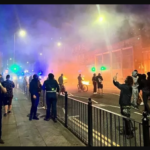From Whoppers to Magnums: The Companies Remaining in Russia Despite the Ukraine War
Starbucks and McDonald’s were among the companies that withdrew as the West imposed sanctions on Moscow, but some firms have chosen to stay.
Some Western companies still operating in Russia are delaying their plans to exit, despite ongoing efforts to isolate the country’s economy.
The invasion of Ukraine triggered a mass exodus of multinational corporations from the Russian market, fearing potential consumer backlash if they remained.
Starbucks and McDonald’s were among the companies that withdrew as the West imposed sanctions on Moscow and aimed to isolate Russia’s economy.
However, nearly two and a half years later, more than 2,000 foreign companies are still operating in Russia, according to the Kyiv School of Economics.
In contrast, approximately 1,750 companies have either scaled back their operations or exited entirely.
Since the war in Ukraine began, the cost and complexity of corporate withdrawal have risen significantly, as the Kremlin aims to reduce capital outflow.
Chris Weafer, an investment strategist with over 20 years of experience in Russia, told Sky News that increasing costs and bureaucratic obstacles have led some clients to pause their departure plans.
“There is a sense that maybe it is too late to leave,” he said.
“Most companies that remain are adopting a ‘keep our heads down and hope conditions improve so we don’t have to leave’ attitude.”
Companies from so-called “unfriendly” states are now forced to sell their assets at a 50% discount.
The Russian government also charges a 15% exit tax on top, but only if the buyer (which must be local) is approved.
According to Mr Weafer, it is part of the Kremlin’s “messaging” to show Russians it can “overcome” the economic constraints imposed by the West.
“When Russian people go to the stores and see the same Western brands that they’ve always been used to, then it fits the message coming from the Kremlin which is that life is normal, that Russia’s been able to withstand the sanctions,” he said.
Consumer goods giant Unilever is among those still operating in Russia.
Despite condemning the war and scaling back its operations, the UK-headquartered company continues to produce Cornettos and Magnums for the local market.
Burger King, along with other prominent Western brands, remains visible in Moscow, despite pledges to leave Russia soon after the war began.
Although maintaining a presence in Russia does not violate sanctions, these companies are contributing to the economy, drawing criticism from campaign groups.
“These Western companies still operating in Russia lack any moral integrity,” Mark Dixon, founder of The Moral Rating Agency, told Sky News.
“It’s absurd for the West to support Ukraine financially while its own companies bolster the Russian economy.”
Unilever has explained its decision to stay in Russia by stating it did not want to abandon its employees.
The company also expressed concern that leaving the country would result in its assets being seized by the state.
When asked for comment, Unilever referred to an October 2023 statement by CEO Hein Schumacher, which said: “The containment actions we have taken clearly minimize Unilever’s economic contribution to the Russian state.
“However, I understand why there are calls for our company to leave the country, and we continue to explore our options.”
Burger King’s owner, Restaurant Brands International (RBI), has previously indicated that the franchise structure of the restaurant hinders its ability to exit.
The Canadian-American company holds a 15% stake in the Russian business, and after the invasion, it claimed its local partner refused to shut down.
The local partner did not respond to a request for comment.
In a statement, RBI told Sky News: “We ceased all corporate support for the Russian market in March 2022, including operations, marketing, and supply chain support, and also denied approvals for new investments and expansions.
“RBI has not earned any profits from Burger King in Russia since early 2022.”
Outside a Burger King branch near Moscow Zoo, some customers expressed their satisfaction at still being able to dine there.
“I’m very happy that at least someone stayed with us,” Irina told Sky News.
Fyodor, with his family, was more skeptical: “It seems that for many corporations, money is far more important than their reputation.”



